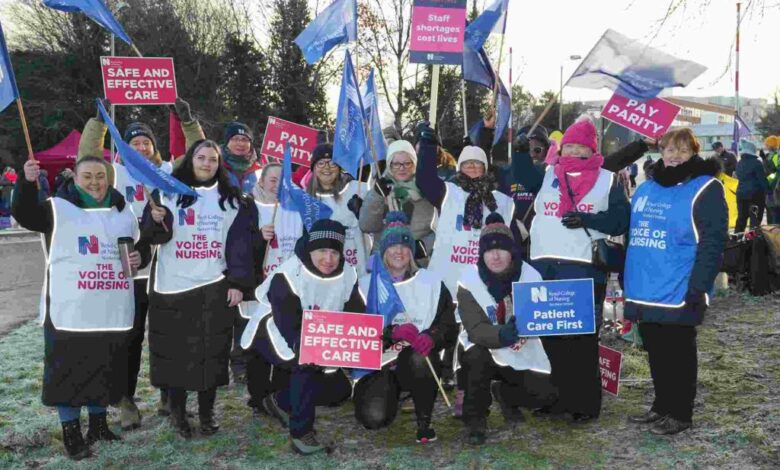Northern Ireland: Nursing unions ‘taking stock’ after strike

Health unions in Northern Ireland are considering their next steps in their fight for fair pay, as the political deadlock in the country continues.
Nurses and other public sector staff took to the picket lines last week in what was described as the biggest strike in Northern Ireland’s recent history.
“If there is no further movement soon, it is inevitable that we will need to consider our next steps”
Rita Devlin
The action came because public sector workers in the country are still without a pay deal for 2023-24, or an improved offer for 2022-23, due to a political impasse in Stormont.
One week on from the mass walkout, and with no resolution in sight, nursing unions have hinted that they are planning their next steps for industrial action.
In a statement published on Tuesday (23 January), Anne Speed, head of bargaining and representation at Unison in Northern Ireland, warned that the union would “not be backing down”.
The union’s health and education industrial action committees would meet next week to discuss their future plans, explained Ms Speed.
She said: “They will take stock of developments to date and plan the next steps in our campaigns to achieve pay justice.
“We are determined to fight on. We will not be backing down.”
For almost two years, the Democratic Unionist Party (DUP) has been boycotting Stormont in defiance of post-Brexit trade policies affecting Northern Ireland.
The UK Government has placed an offer on the table of a £3bn financial package for Northern Ireland, including money to cover a pay deal, on the condition that Stormont is reformed.
However, striking nurses told Nursing Times last week that they did not want to be used as “leverage in some kind of political chess game”.
In her statement, Ms Speed argued that even if the pay deadlock comes to an end, and the funding is released, it would “not be enough” and that members “need an industrial action strategy around that fact”.
She added: “There is a clear, objective need to maintain the broadest possible unity and cohesion on campaigning and industrial action to secure the release of funding to comprehensively settle all pay disputes.
“No one sector in public services can go it alone.”
Ms Speed urged members to stay in touch with local representatives on the next steps.
She added: “We need every worker to support this struggle for pay justice. We will keep you all updated.”
Meanwhile, director of the Royal College of Nursing in Northern Ireland, Rita Devlin, told Nursing Times that it would also “consider our next steps” if there continued to be no movement on pay.
“I am committed to restoring devolution and significant progress has been made towards that objective”
Chris Heaton-Harris
She said: “Irrespective of the current political situation, pay parity with England must be restored as a first step in addressing this crisis.
“Anything less will be unacceptable to our members and can be viewed as further evidence that our concerns over patient safety are not being listened to by those responsible for the governance of Northern Ireland.
“Decisive action on this issue is long overdue and if there is no further movement soon, it is inevitable that we will need to consider our next steps.”
The day of mass industrial action on 18 January coincided with a legal deadline for Northern Ireland political parties to form a government, otherwise the UK secretary of state for Northern Ireland, Chris Heaton-Harris, would have the power to call an election.
However, instead of doing so, Mr Heaton-Harris this week fast tracked a Northern Ireland Executive Formation Bill through parliament, which has extended the deadline for the political parties to reform Stormont to 8 February 2024.
The legislation is expected to receive royal assent by the end of the week.
If there is still no executive by the new deadline, Mr Heaton-Harris is legally bound to call an election unless he extends the deadline again.
He said: “This bill only has a single clause: to extend the period of time Stormont can legitimately come back until the 8th of February.
“I am committed to restoring devolution and significant progress has been made towards that objective.
“I believe that this bill, with the constrained timescales, will be sufficient.”






